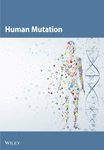Seven novel sequence variants in the human low density lipoprotein receptor related protein 5 (LRP5) gene † ‡
Communicated by Mark H. Paalman
Online Citation: Human Mutation, Mutation in Brief #483 (2001) Online http://www.interscience.wiley.com/humanmutation/pdf/mutation/483.pdf
Abstract
We identified seven novel polymorphisms in the human low density lipoprotein receptor related protein 5 (LRP5) gene. Two of them are predicted to replace amino acid in LRP5 protein (c.314A>G: Q89R and c.4037T>C: V1330A), whereas three are silent mutations in the coding region (c.2268T>C: N740N, c.3405A>G: V1119V, and c.4137C>T: D1363D) and two are polymorphisms in introns (IVS10+6T>C and IVS17-30G>A). Since LRP5 recognizes apolipoprotein E and is genetically linked with type 1 diabetes, these novel polymorphisms will be useful in genetic studies of hyperlipoproteinemia and diabetes. To our knowledge, this is the first report in the literature of sequence variants in the human LRP5 gene. ©2002 Wiley-Liss, Inc.




